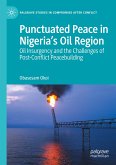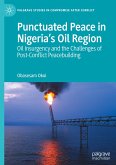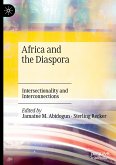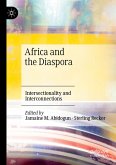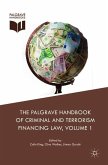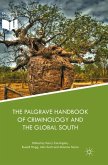The Palgrave Handbook of Violence in Africa
Herausgegeben:Mlambo, Obert Bernard; Chitando, Ezra
The Palgrave Handbook of Violence in Africa
Herausgegeben:Mlambo, Obert Bernard; Chitando, Ezra
- Gebundenes Buch
- Merkliste
- Auf die Merkliste
- Bewerten Bewerten
- Teilen
- Produkt teilen
- Produkterinnerung
- Produkterinnerung
This handbook brings together global research on violence in Africa from academics, practitioners and activists across a multitude of subjects. It seeks to create the widest possible space for debate, discussion, and analysis of the broad range of issues and problems of violence. It transcends disciplinary and geographic borders in order to create new ground in this space. The chapters in this handbook cover diverse themes such as: the topography of violence, technologies of violence, terrorism, civil war and insurgent violence, child soldiers and violence, epistemic violence, structural…mehr
Andere Kunden interessierten sich auch für
![Punctuated Peace in Nigeria¿s Oil Region Punctuated Peace in Nigeria¿s Oil Region]() Obasesam OkoiPunctuated Peace in Nigeria¿s Oil Region74,99 €
Obasesam OkoiPunctuated Peace in Nigeria¿s Oil Region74,99 €![Punctuated Peace in Nigeria¿s Oil Region Punctuated Peace in Nigeria¿s Oil Region]() Obasesam OkoiPunctuated Peace in Nigeria¿s Oil Region74,99 €
Obasesam OkoiPunctuated Peace in Nigeria¿s Oil Region74,99 €![Africa and the Diaspora Africa and the Diaspora]() Africa and the Diaspora110,99 €
Africa and the Diaspora110,99 €![Africa and the Diaspora Africa and the Diaspora]() Africa and the Diaspora110,99 €
Africa and the Diaspora110,99 €![Mass Shootings in Central and Eastern Europe Mass Shootings in Central and Eastern Europe]() Alexei AnisinMass Shootings in Central and Eastern Europe74,99 €
Alexei AnisinMass Shootings in Central and Eastern Europe74,99 €![The Palgrave Handbook of Criminal and Terrorism Financing Law The Palgrave Handbook of Criminal and Terrorism Financing Law]() The Palgrave Handbook of Criminal and Terrorism Financing Law280,99 €
The Palgrave Handbook of Criminal and Terrorism Financing Law280,99 €![The Palgrave Handbook of Criminology and the Global South The Palgrave Handbook of Criminology and the Global South]() The Palgrave Handbook of Criminology and the Global South257,99 €
The Palgrave Handbook of Criminology and the Global South257,99 €-
-
-
This handbook brings together global research on violence in Africa from academics, practitioners and activists across a multitude of subjects. It seeks to create the widest possible space for debate, discussion, and analysis of the broad range of issues and problems of violence. It transcends disciplinary and geographic borders in order to create new ground in this space. The chapters in this handbook cover diverse themes such as: the topography of violence, technologies of violence, terrorism, civil war and insurgent violence, child soldiers and violence, epistemic violence, structural violence, violence and memory, violence and the law, cultural mechanisms for creating, sustaining, resisting, and mitigating violence, political violence, violence in moments of religious, social and geo-political transformation, gender and violence, violence against nature, and violence and social media. It centralises new meanings, understandings and fresh ideas to the concept ofviolence, broadening its scope, and contributing to the debates that will shape Africa's common future. It shines a light on key elements of African culture and the cultural mechanisms for creating, sustaining, resisting, and mitigating violence in Africa. It strives to be relevant to the needs and concerns of African societies by suggesting practical solutions for overcoming violence. This book ties in with development initiatives in Africa, such as Agenda 2063, for the Africa We Want, and the 2030 United Nations Sustainable Development Goals (SDGs).
Produktdetails
- Produktdetails
- Verlag: Palgrave Macmillan / Springer Nature Switzerland / Springer, Berlin
- Artikelnr. des Verlages: 978-3-031-40753-6
- 2024
- Seitenzahl: 1228
- Erscheinungstermin: 7. Mai 2024
- Englisch
- Abmessung: 241mm x 160mm x 77mm
- Gewicht: 2154g
- ISBN-13: 9783031407536
- ISBN-10: 3031407539
- Artikelnr.: 68362777
- Verlag: Palgrave Macmillan / Springer Nature Switzerland / Springer, Berlin
- Artikelnr. des Verlages: 978-3-031-40753-6
- 2024
- Seitenzahl: 1228
- Erscheinungstermin: 7. Mai 2024
- Englisch
- Abmessung: 241mm x 160mm x 77mm
- Gewicht: 2154g
- ISBN-13: 9783031407536
- ISBN-10: 3031407539
- Artikelnr.: 68362777
Obert Bernard Mlambo is Associate Professor in Classical studies and history at the University of Zimbabwe. He is former Georg Forster Research Fellow and former Guest Scholar at the Global South Studies Center of the University of Cologne, Germany. His research is broadly framed by the issues of violence, masculinity, gender and colonialism. His book titled Land Expropriation in Ancient Rome and Contemporary Zimbabwe: Veterans, Masculinity and War (Bloomsbury, 2022) brings the Western Classics and Africa together in a historical context, looking at military violence and military veterans in both Classical and African history and society. He has co-edited (with Ezra Chitando, Sakhmuzi Mfecane and Kopano Ratele) the forthcoming Palgrave Handbook of Men and Masculinities in Africa. Obert Mlambo is currently working on two books, one provisionally titled The Classics and Africa: Intercultural and Postcolonial Dialogue with John McClymont, and another provisionally titled Non-Western Approaches to the Study of Classics. Ezra Chitando serves as Professor in Religious Studies at the University of Zimbabwe, and has served as the Desmond Tutu Extraordinary Professor for Social Justice at the University of Western Cape, South Africa. He has a wide range of research and publication interests, including violence against women, political violence and peace-building. He co-edited the volume Justice Not Silence: Churches Facing Sexual and Gender-Based Violence.
Foreword by Professor Stathis Kalyvas, Oxford.- SECTION A: Technologies of Violence in Africa.- 1. Systemic and Epistemic Violence in Africa; Patricia Pinky Ndlovu: Chair of Sociology and Sabelo J. Ndlovu-Gatsheni, Professor and Chair of Epistemologies of the Global South with Emphasis on Africa and Vice-Dean of Research in the "Africa Multiple Cluster of Excellence".- 2. Theoretical underpinnings of violence in Africa; Clive Tendai Zimunya: Lecturer of Philosophy and Obert Bernard Mlambo, Associate Professor of Classical Studies and History.- 3. Technologies of Violence in Africa; Obert Bernard Mlambo, Associate Professor of Classical Studies and History and Wesley Mwatwara, Historian.- 4. Of Exile as Violence in Lewis Nkosi's Thought; Tendayi Sithole, Department of Political Sciences.- 5. Africa and violence: the metamorphosis and the participation of Child soldiers in conflict zones; Toyin Cotties Adetiba, Department of Political and International Studies.- 6. Structural violence and resource curse in Angola.- 7. Violence against nature in Africa: a historical assessment; Marlino Eugénio Mubai, History, Environmental and Political Ecology.- SECTION B: The State and Violence in Africa.- 8. Understanding Electoral Violence in Africa; Matlosa Khabele, African Union Commission Director for Political Affairs.- 9. Understanding violence from an interpersonal perspective: The case of Zimbabwe and state sponsored violence; Chenai G. Matshaka, Centre for Mediation in Africa and Ruth Murambadoro, the Centre for Feminist Research.- 10. 'Dirge to Slit Bodies': EndSARS, Police Brutality and Nigerian Dystopia in Jumoke Verissimo and James Ye ku's Soro Soke: When Poetry Speaks Up; Ayokunmi O. Ojebode, the Institute for Name-Studies (INS).- 11. The Silent Violence in Africa- Manifestations of Political Violence; Annie Barbara Chikwanha, Politics and International Relations.- 12. Beyond ethnicity: Reflections on the history and politics of violence in Uganda; Evarist Ngabirano, the Makerere Institute of Social Research (MISR).- 13. Ungoverned Space and National Security in Nigeria; Arinze Ngwube, Department of Political Science.- 14. Bound to violence? Interrogating violence in Francophone African literatures; G. Ncube, Stellenbosch University.- SECTION C: Children, Youth and Violence.- 15. Child Soldiers, Conflict and Cultures of Violence in Contemporary Africa, c.1980-2000s; Stacey Hynd, African History and Co-Director of the Centre for Imperial & Global History.- 16. Youth, Proliferation of Small Arms and Light Weapons and Conflicts in 21st Century Africa; Babayo Sule, Department of Political Science and Ibrahim Kawuley, Department of Political Science.- 17. Youth, Violence and Political Accumulation: Urban militias in Harare; Simbarashe Gukurume, Sociology and Social Anthropology and Godfrey Maringira, Sol Plaatje University.- 18. "Even the Holy Book Recommends it"? Corporal Punishment, the Bible and Sacred Violence in Southern Africa; Ezra Chitando, Phenomenology and History of Religion.- 19. "Even the Holy Book Recommends it"? Corporal Punishment, the Bible and Sacred Violence in Southern Africa; Ezra Chitando, Phenomenology and History of Religion.- SECTION D: Violence, Memory and the Law in Africa.- 20. Discourses on Political Violence and State Legitimation in Official Commissions of Inquiry in Africa; Claire-Anne Lester, Stellenbosch University (Legal Sociology, Political Transitions, Transitional Justice); 21. Remembrance as a confrontation of violence? A religio-ethical consideration of the role of memory in a Zimbabwe established and ruled by violence; Collium Banda, Theology; 22. Geographies of Violence and Informalization: The Case of Mathare Slums in Nairobi, Kenya; Maurice Omollo, Maasai Mara Universit and Solomon Waliaula, Maasai Mara University.- 23. Piracy and Violence off the Coast of Nigeria: A Theoretical Analysis; Kalu Kingsley, the Cultural Heritage Preservation Research Institute.- 24. Incest as Dismissal: Anthropology and Clinics of Silence; Parfait D. Akana, Sociologist & Anthropologist.- 25. Violence and post-coloniality in contemporary Zimbabwean literature: the works of Chenjerai Hove; Oliver Nyambi, University of the Free State.- SECTION E: Religion and Cultural Violence in Africa.- 26. In God's Name: Drivers of Violent Extremism in the Northeast Nigeria; Jacinta Chiamaka Nwaka, Peace and Conflict History.- 27. The Epistemic Scaffolding of Religious Violence; Kizito Kiyimba, SJ.- 28. Life transforming Intercultural Pastoral Care and Counseling with transgender and intersex communities in Botswana; Tshenolo Madigele: Theology Lecturer and Oabona Sepora: Institute of Development Management -IDM.- 29. Enchanted Worldviews and Violence Against Persons with Albinism in Sub-Saharan Africa; Francis Benyah, The Study of Religions.- 30. Violence against persons with albinism in Malawi; Jones Hamburu Mawerenga, Systematic Theology, Christian Ethics, and African Theology.- SECTION F: Gender and Violence in Africa; 31. Sexual Violence Against Girls and Women in African Conflict; Veronica Fynn Bruey, Legal Studies.- 32. Persisting inequalities: An intersectional view of climate change, gender and violence; Mary Nyasimi, Inclusive Climate Change Adaptation for a Sustainable Africa and Veronica Nonhlanhla Jakarasi.- 33. Violence against Women in Egypt: A Closer Look at Female Genital Mutilation and Intimate Partner Violence; Yasmin Khodary.- 34. Gender based violence in Ghana:experiences of persons with disabilities in two selected areas; Mantey Efua Esaaba, Social Work.- 35. African Diaspora Women Perpetuating Violence Against Men in the United Kingdom; Nomatter Sande.- 36. Adolescent Boys, Young Men and Mental Health in Southern Africa; Mutsawashe Chitando: Public Health, Health Economics Unit and Division.- SECTION G: Preventing Violent Conflict in Africa.- 37. Developing a Framework for Ending Violence in Africa; David Kaulemu, Philosophy.- 38. Confronting dysfunctional military violence in Africa's electoral spaces: A call for specialised civilian oversight institutions; James Tsabora, Law in the Faculty of Law.- 39. Managing electoral violence through constructive use of social media: Transforming and empowering vulnerable urban youth in Kenya; Joyce W. Gikandi: Christine W. Njuguna, Joan Kabaria- Muriithi, Lucy Kathuri-Ogola.- 40. Managing Conflict in Africa: Challenges and Opportunities for the African Union;Victor H Mlambo: University of Johannesburg School of Public Management, Governance and Public Policy, Ernest Toochi Aniche, Department of Political Science, and Mandla Mfundo Masuku, School of Built Environment and Development Studies.- 41. Through the Afrocentricity Lens: Terror and Insurgency and Implications for Regional Integration in Southern Africa: Reference from Cabo Delgado Province, Mozambique; Daniel N. Mlambo, Tshwane University of Technology.- 42. Insurgency in Mozambique: Incorporating NATO's Article 5 to the Region's Quest for Collective Defence;Victor H Mlambo: University of Johannesburg School of Public Management, Governance and Public Policy, and Mfundo Mandla Masuku: School of Built Environment and Development Studies, and Daniel N. Mlambo: Department of Public Management.
Foreword by Professor Stathis Kalyvas, Oxford.- SECTION A: Technologies of Violence in Africa.- 1. Systemic and Epistemic Violence in Africa; Patricia Pinky Ndlovu: Chair of Sociology and Sabelo J. Ndlovu-Gatsheni, Professor and Chair of Epistemologies of the Global South with Emphasis on Africa and Vice-Dean of Research in the "Africa Multiple Cluster of Excellence".- 2. Theoretical underpinnings of violence in Africa; Clive Tendai Zimunya: Lecturer of Philosophy and Obert Bernard Mlambo, Associate Professor of Classical Studies and History.- 3. Technologies of Violence in Africa; Obert Bernard Mlambo, Associate Professor of Classical Studies and History and Wesley Mwatwara, Historian.- 4. Of Exile as Violence in Lewis Nkosi's Thought; Tendayi Sithole, Department of Political Sciences.- 5. Africa and violence: the metamorphosis and the participation of Child soldiers in conflict zones; Toyin Cotties Adetiba, Department of Political and International Studies.- 6. Structural violence and resource curse in Angola.- 7. Violence against nature in Africa: a historical assessment; Marlino Eugénio Mubai, History, Environmental and Political Ecology.- SECTION B: The State and Violence in Africa.- 8. Understanding Electoral Violence in Africa; Matlosa Khabele, African Union Commission Director for Political Affairs.- 9. Understanding violence from an interpersonal perspective: The case of Zimbabwe and state sponsored violence; Chenai G. Matshaka, Centre for Mediation in Africa and Ruth Murambadoro, the Centre for Feminist Research.- 10. 'Dirge to Slit Bodies': EndSARS, Police Brutality and Nigerian Dystopia in Jumoke Verissimo and James Ye ku's Soro Soke: When Poetry Speaks Up; Ayokunmi O. Ojebode, the Institute for Name-Studies (INS).- 11. The Silent Violence in Africa- Manifestations of Political Violence; Annie Barbara Chikwanha, Politics and International Relations.- 12. Beyond ethnicity: Reflections on the history and politics of violence in Uganda; Evarist Ngabirano, the Makerere Institute of Social Research (MISR).- 13. Ungoverned Space and National Security in Nigeria; Arinze Ngwube, Department of Political Science.- 14. Bound to violence? Interrogating violence in Francophone African literatures; G. Ncube, Stellenbosch University.- SECTION C: Children, Youth and Violence.- 15. Child Soldiers, Conflict and Cultures of Violence in Contemporary Africa, c.1980-2000s; Stacey Hynd, African History and Co-Director of the Centre for Imperial & Global History.- 16. Youth, Proliferation of Small Arms and Light Weapons and Conflicts in 21st Century Africa; Babayo Sule, Department of Political Science and Ibrahim Kawuley, Department of Political Science.- 17. Youth, Violence and Political Accumulation: Urban militias in Harare; Simbarashe Gukurume, Sociology and Social Anthropology and Godfrey Maringira, Sol Plaatje University.- 18. "Even the Holy Book Recommends it"? Corporal Punishment, the Bible and Sacred Violence in Southern Africa; Ezra Chitando, Phenomenology and History of Religion.- 19. "Even the Holy Book Recommends it"? Corporal Punishment, the Bible and Sacred Violence in Southern Africa; Ezra Chitando, Phenomenology and History of Religion.- SECTION D: Violence, Memory and the Law in Africa.- 20. Discourses on Political Violence and State Legitimation in Official Commissions of Inquiry in Africa; Claire-Anne Lester, Stellenbosch University (Legal Sociology, Political Transitions, Transitional Justice); 21. Remembrance as a confrontation of violence? A religio-ethical consideration of the role of memory in a Zimbabwe established and ruled by violence; Collium Banda, Theology; 22. Geographies of Violence and Informalization: The Case of Mathare Slums in Nairobi, Kenya; Maurice Omollo, Maasai Mara Universit and Solomon Waliaula, Maasai Mara University.- 23. Piracy and Violence off the Coast of Nigeria: A Theoretical Analysis; Kalu Kingsley, the Cultural Heritage Preservation Research Institute.- 24. Incest as Dismissal: Anthropology and Clinics of Silence; Parfait D. Akana, Sociologist & Anthropologist.- 25. Violence and post-coloniality in contemporary Zimbabwean literature: the works of Chenjerai Hove; Oliver Nyambi, University of the Free State.- SECTION E: Religion and Cultural Violence in Africa.- 26. In God's Name: Drivers of Violent Extremism in the Northeast Nigeria; Jacinta Chiamaka Nwaka, Peace and Conflict History.- 27. The Epistemic Scaffolding of Religious Violence; Kizito Kiyimba, SJ.- 28. Life transforming Intercultural Pastoral Care and Counseling with transgender and intersex communities in Botswana; Tshenolo Madigele: Theology Lecturer and Oabona Sepora: Institute of Development Management -IDM.- 29. Enchanted Worldviews and Violence Against Persons with Albinism in Sub-Saharan Africa; Francis Benyah, The Study of Religions.- 30. Violence against persons with albinism in Malawi; Jones Hamburu Mawerenga, Systematic Theology, Christian Ethics, and African Theology.- SECTION F: Gender and Violence in Africa; 31. Sexual Violence Against Girls and Women in African Conflict; Veronica Fynn Bruey, Legal Studies.- 32. Persisting inequalities: An intersectional view of climate change, gender and violence; Mary Nyasimi, Inclusive Climate Change Adaptation for a Sustainable Africa and Veronica Nonhlanhla Jakarasi.- 33. Violence against Women in Egypt: A Closer Look at Female Genital Mutilation and Intimate Partner Violence; Yasmin Khodary.- 34. Gender based violence in Ghana:experiences of persons with disabilities in two selected areas; Mantey Efua Esaaba, Social Work.- 35. African Diaspora Women Perpetuating Violence Against Men in the United Kingdom; Nomatter Sande.- 36. Adolescent Boys, Young Men and Mental Health in Southern Africa; Mutsawashe Chitando: Public Health, Health Economics Unit and Division.- SECTION G: Preventing Violent Conflict in Africa.- 37. Developing a Framework for Ending Violence in Africa; David Kaulemu, Philosophy.- 38. Confronting dysfunctional military violence in Africa's electoral spaces: A call for specialised civilian oversight institutions; James Tsabora, Law in the Faculty of Law.- 39. Managing electoral violence through constructive use of social media: Transforming and empowering vulnerable urban youth in Kenya; Joyce W. Gikandi: Christine W. Njuguna, Joan Kabaria- Muriithi, Lucy Kathuri-Ogola.- 40. Managing Conflict in Africa: Challenges and Opportunities for the African Union;Victor H Mlambo: University of Johannesburg School of Public Management, Governance and Public Policy, Ernest Toochi Aniche, Department of Political Science, and Mandla Mfundo Masuku, School of Built Environment and Development Studies.- 41. Through the Afrocentricity Lens: Terror and Insurgency and Implications for Regional Integration in Southern Africa: Reference from Cabo Delgado Province, Mozambique; Daniel N. Mlambo, Tshwane University of Technology.- 42. Insurgency in Mozambique: Incorporating NATO's Article 5 to the Region's Quest for Collective Defence;Victor H Mlambo: University of Johannesburg School of Public Management, Governance and Public Policy, and Mfundo Mandla Masuku: School of Built Environment and Development Studies, and Daniel N. Mlambo: Department of Public Management.


